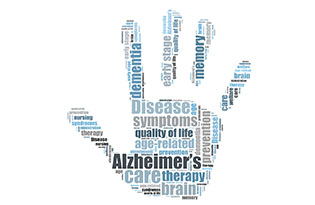Struggling with questions about Alzheimer's disease?
6/19/2025 by Mairead Bartley, M.B., B.Ch., B.A.O., M.D., and Maria Mendoza De la Garza M.D.

Dementia is a general term for disorders that affect memory and other brain functions, causing changes in a person's ability to perform day-to-day activities. Dementia is progressive, meaning that it worsens over time, usually years. Alzheimer's disease is the most common type of dementia.
Usually, the first symptom of Alzheimer's disease is a change in memory, with difficulty learning new things or remembering recent events. Other changes can occur as time progresses, such as changes to personality, behavior, speech, swallowing and walking.
Some people may have a family history, but aging is the most significant risk factor.
When to get help
If you notice changes in your memory or that of a family member, you should discuss this with your primary care clinician. Some people may not see the changes themselves. Often, a family member or a close friend will first notice a difference.
Evaluation and treatment
The first step is to be evaluated to assess the changes. Many issues can cause changes to memory with age, and not all of them indicate Alzheimer's disease or another type of dementia. The evaluation typically involves visiting your primary care clinician to discuss the changes, a cognitive test, blood tests and brain imaging. Other testing may be necessary.
If you are diagnosed with Alzheimer's disease, your clinician will discuss options that can help you and your care partner. Lifestyle options and modifications are essential, such as regular exercise, maintaining social interactions and cognitively stimulating activities, addressing cardiovascular health (blood pressure control) and maintaining a healthy diet. While there is no cure, medications may have some benefits in slowing progression. Your clinician will review these options with you.
Since Alzheimer’s disease is a progressive condition, it is essential to plan. People may need help managing medications, finances, transportation or assistance with other day-to-day activities at home. Preparing an advanced directive allows a person's wishes for medical care to be known. It also allows a trusted person to be nominated to help with decision-making when needed.
A big part of caring for people with Alzheimer's disease is helping the person and their care partner live as well as they can. Support groups, educational resources and community resources are available. Your healthcare clinician can help connect you with resources in your area.
Mairead Bartley, M.B., B.Ch., B.A.O., M.D., is a Community Internal Medicine, Geriatrics, and Palliative Care physician at Mayo Clinic in Rochester. Her interests include dementia care and care of medically complex older adults in skilled nursing facilities and homebound settings.
Maria Mendoza De la Garza, M.D., is a Community Internal Medicine, Geriatrics, and Palliative Care physician at Mayo Clinic in Rochester. She is a geriatrician with vast experience caring for high-risk, frail, medically complex older adults. Her clinical practice is focused on the care spectrum of skilled nursing facilities, home-based and outpatient care.
